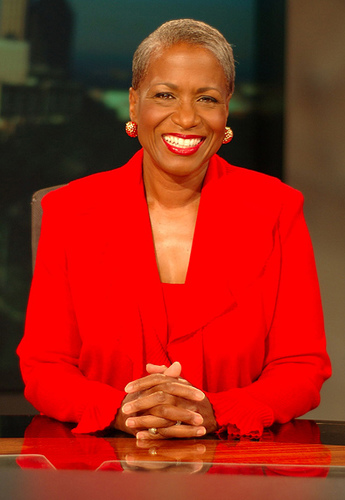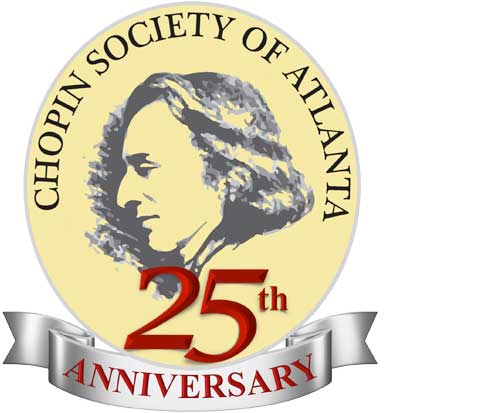Return to
2013 Gala Evening with Chopin
Delicious Alternative
Exclusive interview with Monica Kaufman Pearson, former Atlanta’s Channel 2 Action News anchor
and guest of honor at the Chopin Society of Atlanta’s 2013 Gala
by Bożena U. Zaremba
“First woman...,” “first African-American…,” “first minority…” — These phrases often come up in your biographies or introductions to your achievements. How difficult was it to be “first”?
It was very hard because of the community. The people I worked with were wonderful. John Pruitt was like a brother to me during that time. But people would call in and say very negative things. People resented me for getting a position they felt should only be for men. It was not only from the white community; it was also from the black community, who expected me to look and talk and dress in a certain way. But I started speaking at schools, at churches and events, and I always treated people with kindness so when people got to know me, it changed. I say all the time I am glad that Twitter and Facebook didn’t exist back then because I might not have been able to maintain my sanity. It was just telephone and handwritten letters back then.
I gather it was harder to break the barriers because you were a woman, not because you were black.
Yes, absolutely, because the males on the anchor team were considered authoritative, and when you put a woman in that position it changes the image; it makes her chief-in-control, and she has the power, and some people were very uncomfortable with that.
What is your greatest contribution in advancing the role of women?
I would say it was the story I did on the Georgia High School Association. The GHSA controls all competitions within the school system from band to debates to sports of any kind. And for almost 82 years (as of the time when I did the story), they had never had a woman on their board of directors, although they were setting the rules for girls’ sports. So after I did my report, they added women to the board, and at that point they made sure that soccer became a statewide sport for girls. Because of that, girls can now go to college on soccer scholarships. The same goes for cheerleading. To me, that’s the highlight of my career because it opened the doors of possibilities for young girls who might not be able to go to college except through such scholarships.
What challenges did you face when you started that nowadays women or minorities don’t?
Well, they still face them. I hate to say that. We take everything for granted because we live in a large city, so in Atlanta when you look around, all of the TV stations have women anchoring the news, but if you go into smaller cities, where pundits are extremely conservative, you may not see a woman or a minority on the air. So it will be a while before the “first” phrase disappears.
Did being “first” entail a lot of responsibility?
Oh, absolutely. But the real responsibility is to do your job as best as you can and not to compare yourself to other people. You have to be original, you have to be yourself, and you have to be, as my mother used to say, twice as good as anybody else. So yes, there are certain pressures, especially if you are black or a woman, or both, because women in the community will say you’ve got to do well, and people in the black community will say the same thing. It’s easy to be the first, but it’s hard to maintain the position and set a standard of excellence that will allow someone else to get into that position. So expectations are high, and you have to learn how to say “no” to every speaking engagement request that you receive and select only those that really are important to you and the community. But you also must set limits on your personal time, because if you don’t, you will overwork yourself and won’t perform as well as people think you should. You cannot be all things to all people.
Recently, following a 45-year career as a reporter, you retired. How are you enjoying your retirement?
I’m loving it, because I am a student now. Last year I enrolled in a graduate school at the University of Georgia in order to get my master’s degree in journalism and mass communication so I could teach part time. So if everything goes as planned, I will be graduating in spring. And then I am doing something I’ve always wanted to do. I love to dance, so I am taking Zumba classes three or four days a week, which helped me get rid of the 15 pounds I had gained after I started the graduate school [laughs]. So I’m having fun doing things that I want to do versus things I have to do because they would be good for the station, and I only take those speaking engagements that truly interest me.
But you did love your job, didn’t you?
Oh, it was the best job in the world! But there were things that I wanted to do in my youth but I was too responsible to pursue. I always wanted to be a singer, so after I get my degree, I might start voice lessons and then maybe one night run to a club and be a performer for my friends and family just to say I’ve done it. So I loved my job, but now is the time for somebody else to do it, and it’s time for me to discover the new Monica [laughs].
I have seen a video on YouTube of you singing a national anthem on the 4th of July, 2012. You have a lovely, powerful voice with such a pleasant warm tone.
Thank you!
You once said that you need to have something outside your job, a passion, a hobby. Is it because you were afraid that once you retire you would have nothing to do?
No. I’ll tell you why. You need to get outside yourself. If you stay only within your job, you start to believe your own virtual reality because people see you on television and all of a sudden you are a “star.” When you happen to lose that job, you don’t have anything else to define you. I’ve seen people who have left the business and almost had a breakdown because they didn’t know what to do with themselves. I always say that my job is wonderful, but it does not define entirely who I am. You’ve got to have a life away from your work in order to maintain your sanity and also to maintain your sensibilities and your balance. And my community involvement is much more important to me than my job. I don’t define myself by my work; I define myself by what I do away from work.
Community work—that’s what stands out in your biography. Where does your civic drive and dedication come from? Personality? Upbringing? Education?
I think it comes from my mother. Even though she made minimum wage, she always felt it was important to give back, so we would go to older friends’ homes in our neighborhood and she would read to them or would go grocery shopping for them. So that volunteer spirit comes from the example set by my mother. She lives at the Sunrise [Senior Living] in Buckhead, and at the age of 90 she is the official greeter for people who come to visit the facility. And she will go on what they call a “Memory Impaired” floor and read to people. She is really one of those folks who constantly give, and when you grow up seeing that, you emulate it. My mother always says, “To whom much was given, much is expected.” You receive your gift not to benefit from it alone but to share with others.
Let’s talk about what’s closest to the Chopin Society of Atlanta mission, namely, education.
That’s extremely important. That was the reason why I agreed to be a part of this event, because so much music has been taken away from schools, and classical music has just about disappeared from the schools. This is one opportunity for people to realize that classical music, when you think when it was created, is really popular music, and it is music that is not only beautiful, but it’s soothing and it’s a way of being transported to another reality. I love the idea of providing scholarships to students and providing programs to students to learn about classical music. It’s really a shame that children don’t know about Chopin, they don’t know about Wagner, they don’t know about Mozart. So music appreciation is extremely important, appreciation of music of all cultures, because music is truly a universal language.
What is the best way to educate children through art?
You have to be introduced to it, and you have to be introduced to it as a creator. When I was little, my mother used to give me crayons and paints and tell me to express myself. And even though I never learned to play an instrument, there was music around my house all the time and I was exposed to music. You teach children by getting them involved, by taking them to a concert. It doesn’t have to be at the Atlanta Symphony Orchestra; it can be at a small gathering. There are plenty of concerts that are free or inexpensive. You take children and then you take them home and tell them, “Let’s try creating some music. What type of rhythms did you hear?” Many people don’t do it now because they just don’t have time. Everybody is in a hurry to get somewhere, but it’s time to slow down and enjoy those things like music because if we don’t—I would hate to see that ours would be the last batch of classical music lovers because people in America don’t take time to listen to it.
What about what I call junk music? We all—not just kids—are constantly being exposed to low-quality entertainment. How do we balance those things? How do we make classical music more attractive?
When I watch cartoons, it always amazes me how much classical music is used in them. Children enjoy it, but they aren’t told this is classical music. It’s just as simple as a parent taking the time to sit down with their children and letting them know. Also when you listen to contemporary music, you have to explain to children what’s wrong with it. Sometimes you have to listen to music from other genres to show how it sounds very much like something that has been written before, and sometimes there is so much classical music there. So you have to be creative because the reality is that there is going to be junk out there, but you have to offer an alternative. That’s why I love what the Chopin Society of Atlanta and the Atlanta Symphony Orchestra are doing: concerts for children, because they provide the opportunity. The junk music is going to be there. It’s like junk food, but when you learn how junk food hurts you, you stay away from it. Let them taste something that is delicious and inviting that they haven’t tasted before. Most children don’t know the difference between junk and good until there are exposed to both.
Soon you are going to be a teacher yourself. What is the most important thing you would like to pass on to your students?
The ability to write conversationally. That means to talk to your computer and also the reader as if you were talking to someone while sitting in a room. Conversational writing is difficult, but it’s something that you can learn. I also want the students to understand the importance of doing great research, because the research determines the type of questions that you ask. I really want students to learn to listen, because when you listen, instead of doing question after question, your interview may go into a different direction, maybe a direction much better than what you had planned to write about. That’s something I really want to teach young people: how to do research, how to listen and then how to write in a way that people will remember.















